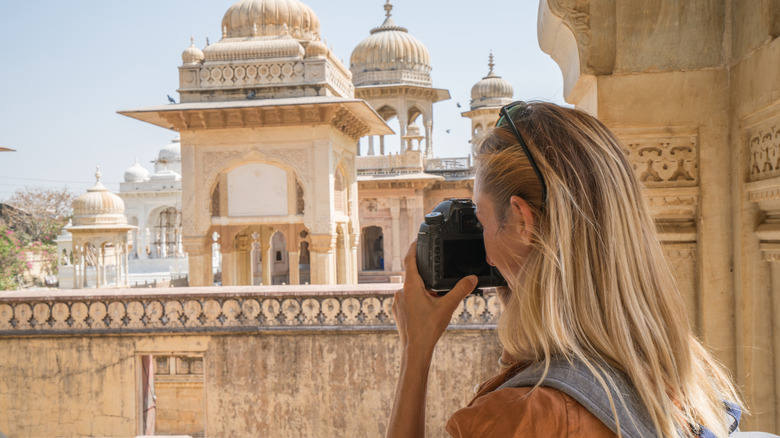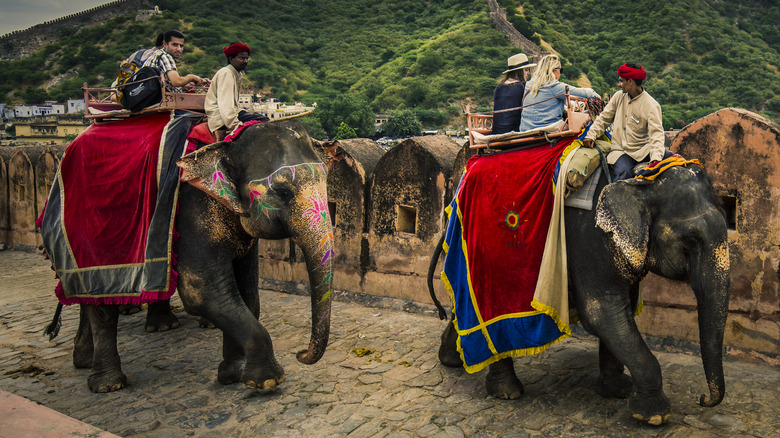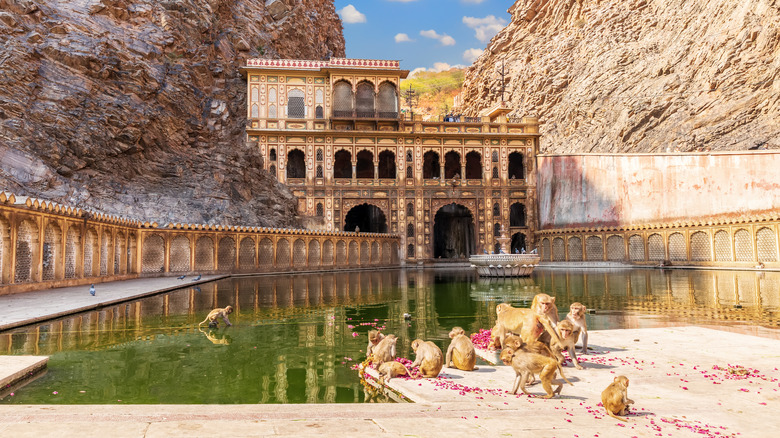The Popular Tourist Activity You Should Never Do On Your Trip To India
India is on many travelers' bucket lists for a reason. The country is home to the awe-inducing Taj Mahal, a portion of the vast Himalayan mountain range, and some of the world's most bustling big cities. It's also a nation bursting with culture, from the ancient temples to the contemporary yoga centers. And we haven't even talked about the food yet — you'll never forget the flavorful biryani rice and soft paneer after taking a trip to India.
Just like in most other travel hubs around the world, the South Asian country also has its fair share of commercialized attractions and tourist traps. For instance, the local rickshaws might look like a fun way to get around, but they're commonly used to scam unsuspecting tourists into overpaying for a ride. Similarly, large street markets are known to sell junk souvenirs to visitors, while the locals know that the best items are actually found at the small, hidden spots.
But there's one popular tourist activity in particular that you should always steer clear of: elephant rides. Sure, a ride on the back of an elephant is a once-in-a-lifetime experience — and it can make for some fun travel selfies — but there's nothing enjoyable about the activity for the animals involved.
Elephant rides are risky and inhumane
If you're an animal lover, you might be drawn to the elephant rides found in Jaipur and other cities in India, but that love for animals is one reason to avoid the tourist activity. Several animal rights organizations have sounded the alarm on the practice, noting the abuse that often takes place before and after the rides. According to Wildlife SOS, elephants aren't naturally as docile and easy to control as they seem to be when interacting with travelers. To tame the animals, handlers torture and physically abuse the elephants with bullhooks to make them tired and fearful.
If that wasn't bad enough, the giant mammals commonly suffer from injuries and disabilities. Yet they continue to be used day after day to carry thrill-seeking tourists, who often aren't aware of the elephants' pain and discomfort. Wildlife SOS adds that many elephants are made to work up to 20 hours a day. When they're given a chance to rest, the activist group World Animal Protection explains that they're often chained up, unable to roam freely.
Even if you're unconcerned about animal cruelty, elephant rides should still be avoided during your trip to India. A report by the Animal Welfare Board of India (via Hindustan Times) revealed that nearly 10% of riding elephants at one site had tuberculosis, a disease that can be transmitted to humans. For your — and the animals' — safety, stick to trains and boats, not the backs of elephants.
Animal-friendly experiences in India
If you want to meet animals, look for a wildlife sanctuary or national park in India rather than a zoo or business that turns animals into an attraction. You can find a variety of different options in the Asian country, from tiger reserves to forests full of exotic birds. Do some research before visiting since not all sanctuaries are equally kind to the animals. When possible, choose one that allows the wild residents to live in a natural habitat, free of chains and other barriers. Also, be wary of sites where the animals are trained to perform or interact with humans.
If you're open to some animal-free cuisine, India is one of the best destinations in the world. Some estimates suggest that nearly 40% of the country's population follows a vegetarian diet, making it easy to find local foods that don't contain chicken, pork, and other animal ingredients. In fact, the entire city of Palitana, located in Gujarat, is completely vegetarian by law. While you will still find dairy in the area, the production and sale of meat and eggs have been banned.
Finally, organize a trip to one of India's animal-friendly temples. According to Hinduism, living beings — from the furry to the feathered — are worthy of respect, and there's no better place to see this principle in action than at the Hindu temples. Consider a visit to Galtaji Temple, a paradise for monkeys, or Karni Mata Temple, where wild rodents are treated like pets.


